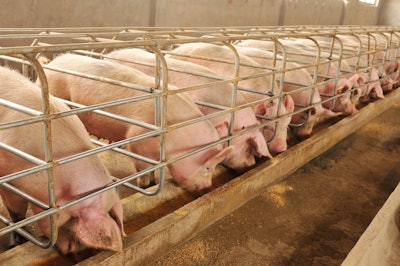
Among the latest outbreaks of African swine fever (ASF) reported in Europe are some involving commercial farms, while 11 countries in the region have confirmed new cases in wild boar. In Asia, ASF has been detected for the first time in a new district of Bhutan, while further cases have been registered in Indonesia, the Philippines and Vietnam.
Over the past week, seven European countries have confirmed new outbreaks in domestic swine.
There were 20 new outbreaks, based on the latest update of the Animal Disease Information System by the European Commission (EC). This covers the period July 18-24.
Of these latest outbreaks, eight were in Romania, three in each of Germany and Poland, two in each of Bosnia-Herzegovina and Ukraine, and one in Moldova.
According to this source, 13 of the region’s nations have registered one or more ASF outbreaks in this population so far in 2024. Worst affected have been Serbia (116 outbreaks to date), Romania (101), Ukraine (29), and Bosnia-Herzegovina and Poland (each with 25).
Through its system, the EC monitors the disease situation across European Union members and adjacent states.
Although not covering exactly the same time period, notifications sent to the World Organisation for Animal Health (WOAH) by the national veterinary agencies give more details of each country’s confirmed outbreaks.
The great majority of the latest Romanian outbreaks have affected backyard herds comprising no more than 35 animals. However, one larger herd of 166 pigs has also been hit, according to recent reports.
In Moldova, the only newly confirmed outbreak involved a farm with 530 domestic swine in the northern district of Singerei.
After a hiatus of more than two years, ASF has been detected again in Ukraine’s southeastern region of Zaporizhzhia, according to a recent notification. Affected was a backyard herd. However, in Sumy in the northeast of the country, a second outbreak has involved a commercial farm with a herd of approximately 320 animals.
During the past week, Poland’s animal health agency has confirmed with WOAH a further six ASF outbreaks in domestic pigs. Directly affected were 1,380 animals in herds of between two and 600.
Latest update on the disease situation from Poland’s chief veterinary office puts the nation’s total outbreaks so far this year at 27, involving 9,520 pigs.
Among the latest outbreaks was the first of the year in domestic pigs in Pomerania. Located in the north of the country, it is the sixth Polish province with cases in farmed pigs so far this year.
Meanwhile, the number of confirmed outbreaks in the western German state of Hesse has jumped to five. The four premises to have been affected were all described as “farms.” With a total of 1,340 pigs, herd sizes ranged from 16 to 1,129. So far, all infected premises in Hesse have been located in the same district, Gross-Gerau.
ASF spreads in Italy’s wild boar population
Since the country’s first ASF cases in early 2022, the number of confirmed cases in wild boar in Italy has now reached 2,407.
According to an official source, this total now includes a first case in the region of Tuscany (Toscana). It brings to nine the number of regions recording ASF-positive cases in this population. The latest case was found in Massa-Carrara. A province in the northwest of Tuscany, it is adjacent to Emilia-Romagna and Liguria, which are regions where the ASF virus has been detected already in wild boar.
Over the period July 18-24, 11 European countries registered a total of 158 new ASF outbreaks in wild boar with the EC System.
Greatest increases over the week were recorded by Latvia (49), followed by Poland (39), Italy (27) and Germany (23). Confirming no more than nine outbreaks each were Estonia, Greece, Hungary, Lithuania, Romania, Slovakia and Ukraine.
So far this year, highest totals have been reached by Poland (1,084) and Italy (1,081), followed by Latvia (474) and Lithuania (472).
New British government urged to beef up border controls
After the recent general election in the United Kingdom (U.K.), the National Pig Association (NPA) called on the newly appointed farming minister to prioritize national biosecurity and border controls.
The ongoing spread of ASF within Europe is a serious concern for U.K. pig producers, according to the NPA. It says a lack of controls now additionally represents an increased threat of the ASF virus into the country through legally imported meat. Illegal meat imports continue to be a risk.
According to NPA, Minister Daniel Zeichner agreed this was also a priority for him, and further meetings on these issues will be scheduled.
Meanwhile, one pig farmer in Scotland explained his fears on STV this week.
“For me, if it came into the herd, it would be devastating, the whole herd would have to be culled,” said Roderic Bruce, chair of Scottish Pig Producers. “We have to stop it from coming into the country because once we’re designated as a swine fever country, our export markets go.”
After Brexit, checks on meat imports into Great Britain were postponed several times before finally coming into operation at the end of April.
However, for Quality Meat Scotland’s Andy McGowan, concerns remain as he says checks on incoming meats are still not being carried out.
ASF developments in Asia
ASF virus has been detected for the first time in the Paro district of Bhutan, according to a new notification to WOAH.
Detection came after the death of one of two domestic pigs in a backyard herd in this western district.
In South Korea, five more wild boar have tested positive for the virus during the past week, reports Pig & People. Total cases in the country stand at 4,138 (as of July 26), while the number of outbreaks involving the nation’s domestic swine remains unchanged at 44.
Since the start of 2024, a total of 312 outbreaks have occurred in Indonesia, according to the national animal health information system. Directly affected so far have been 5,167 pigs.
Over the past week, four more outbreaks have been recorded — all in the hitherto worst-affected province of East Nusa Tenggara — involving 33 swine.
Vietnam’s outbreak total for the year so far has risen to 660, reported Vietnam News on July 15. While the number of pigs culled to reduce the spread of infection has risen past 42,200, this source puts the number of provinces/cities affected so far this year at an unchanged 44.
In the Central Visayas region, some pigs that recently died in the Cebu City area have tested positive for ASF virus, reports the official Philippine News Agency (PNA). A second round of testing after 15 days would confirm the result. In the meantime, in the city area authorities have stepped up monitoring, and banned all imports of undocumented pork into the area.
This week, the same source reported Agriculture Secretary Francisco Tiu Laurel Jr. declaring he wants ASF to be resolved in the country by the end of this year.
For the procurement and rollout of ASF vaccines, he has allocated a budget of PHP350 million (US$6 million), he said.
A government-controlled rollout is scheduled to begin in September, according to PNA. Using the only vaccine from Vietnam that has been authorized for use in the Philippines’ by its Food and Drug Administration, testing will be carried out in the red (infected) zone, yellow zone (no outbreaks but a moderate risk of infection), and other selected disease “hotspots.”
If all goes well, commercial mass vaccinations could start by 2025, according to Laurel.
View our continuing coverage of the global African swine fever situation.


















